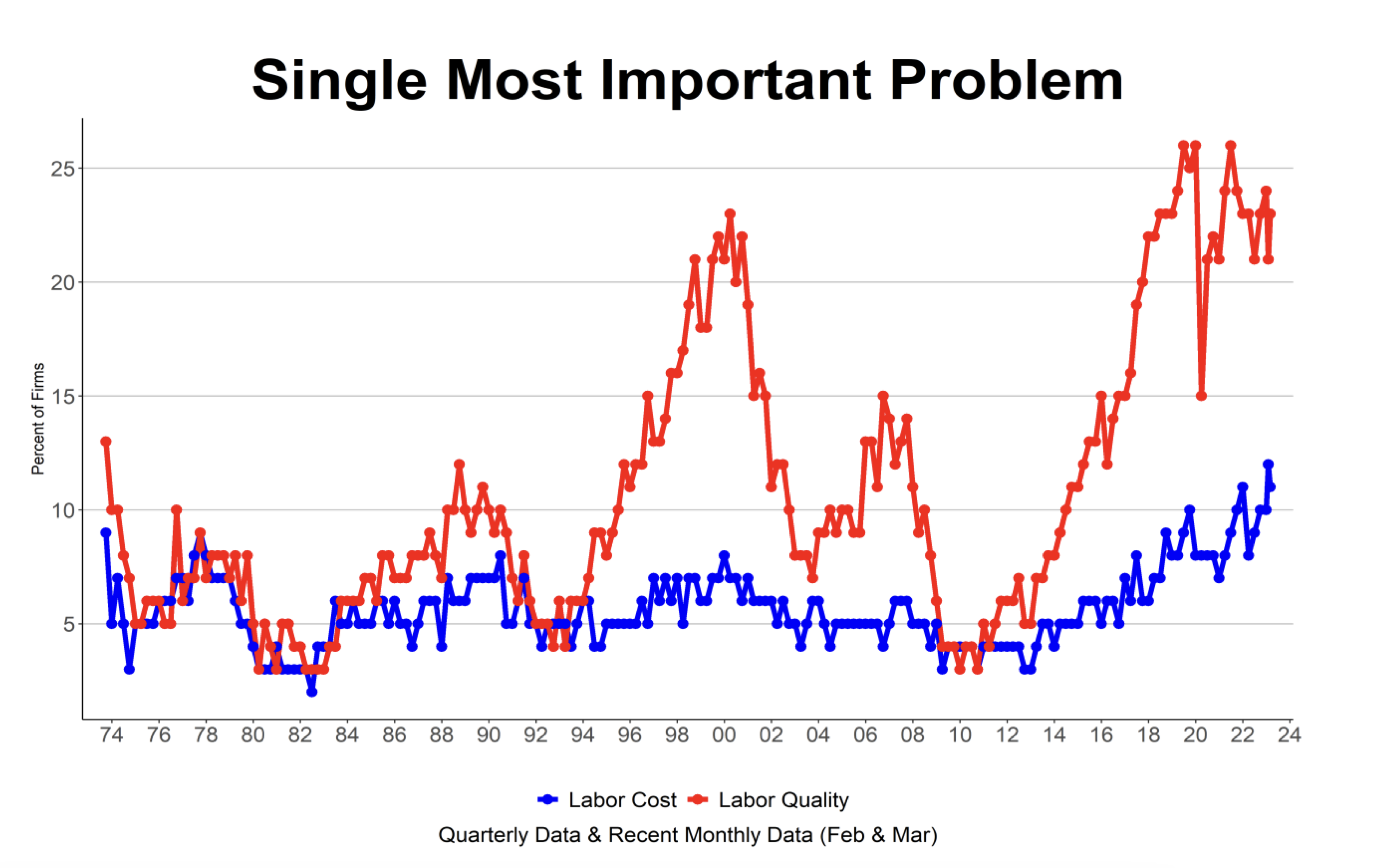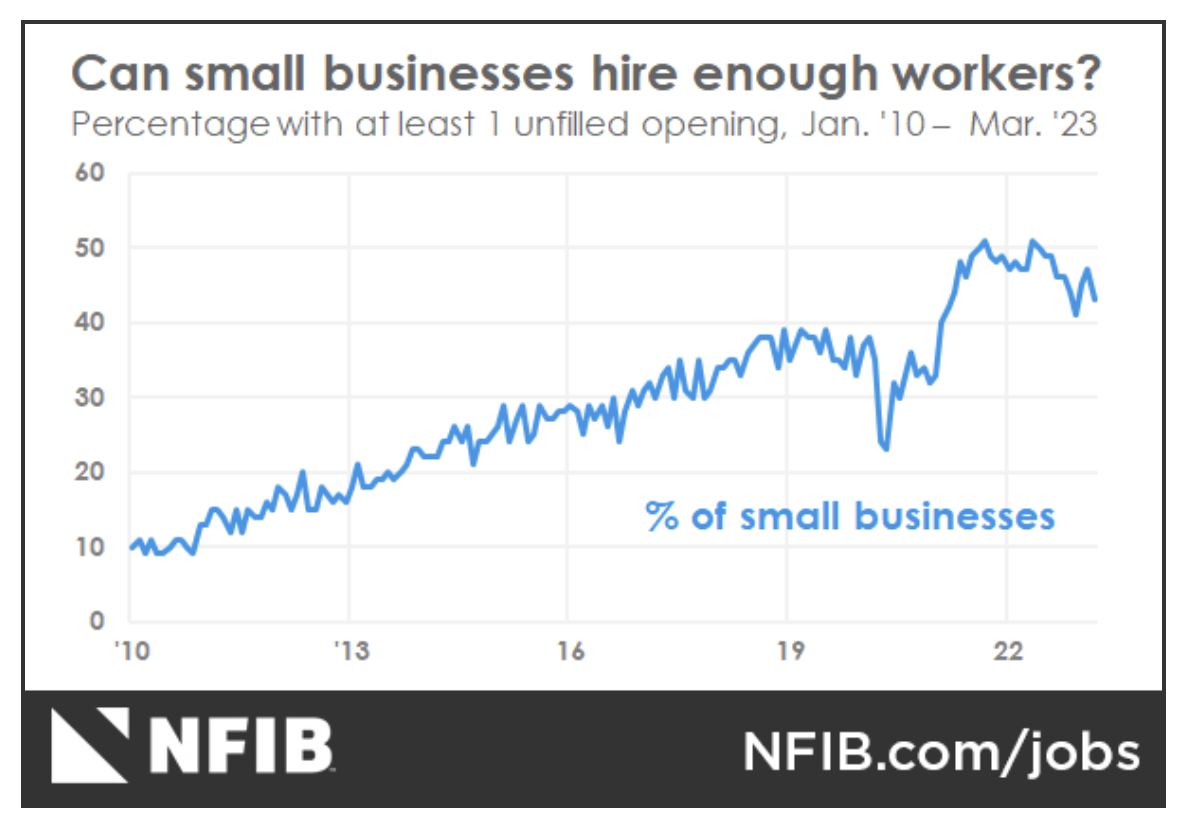If you’re a business owner or manager, losing your best employees can be frustrating and hurt your company’s success. High turnover rates can be costly for your small business, impact productivity and morale, and according to the NFIB’s March Job report, create vacancies in your business that are not quickly filled.
Out of 10,000 small business owners surveyed, the report found that 23% said finding and hiring quality labor is currently their top operating problem.


“The labor force participation rate remains below pre-COVID levels, which is contributing to the shortage of workers available to fill open positions,” said NFIB Chief Economist Bill Dunkelberg. “Small business owners are struggling to take advantage of current sales opportunities.”
Shockingly, the report also found that 59% of business owners reported hiring or trying to hire in March. Of those hiring or trying to hire, a staggering 90% reported few or no qualified applicants for their open positions. 26% reported few qualified applicants, and 27% said none.


In light of this information, now is the time to retain your top talent and invest in their futures. In this article, we’ve identified five reasons why your best talent may be leaving and five ways you can prevent it.
1. Problem: Lack of Growth Opportunities
One of the most common reasons employees leave a company is a lack of growth opportunities. If your most ambitious staff members have hit the ceiling of their career development, they may start looking for new opportunities elsewhere.
Solution: Offer training programs, mentorship opportunities, and promotions based on performance to keep your employees motivated and engaged. Consider involving loyal and long-term staff in critical business decisions to make them feel like their skills and experience can significantly impact the company’s future.
2. Problem: Ineffective Management
Another common reason employees leave is because of poor management. Employees who feel unsupported, micromanaged, or undervalued by their managers are more likely to seek employment elsewhere.
Solution: It’s always a good idea to prioritize strong management practices. Train your managers to provide regular feedback, establish clear goals, and support their employees’ professional development. Managers who help staff rather than try to control them will likely attract loyal, high-performing employees and help retain your top talent.
3. Problem: Lower Compensation and Benefits
If your employees don’t feel fairly compensated for their work, they may look for greener pastures. Additionally, your employees may be more likely to leave if your company does not offer competitive benefits, such as healthcare or retirement plans.
The phenomenon of quiet quitting also applies here, as underpaid staff may only do the bare minimum and refrain from expressing novel ideas about ways to improve business operations. The employees who interact with customers and clients or perform basic tasks are often best positioned to notice opportunities for improving productivity. However, they might not bother mentioning these ideas if they feel it’s outside the scope of their compensation.
Solution: Experienced employees are some of the most valuable. While new hires may have the same knowledge, there’s a significant difference between knowing something and understanding how to apply that knowledge to achieve a goal. While the budget available for staffing may have little leeway, it’s vital to consider remuneration against the cost of having a higher turnover.
4. Problem: Toxic Work Environment
A toxic work environment is a workplace where employees feel threatened, harassed, or otherwise uncomfortable due to the behavior of their colleagues or superiors. This type of environment can be characterized by bullying, discrimination, micromanagement, favoritism, poor communication, and lack of support or recognition.
A toxic work environment can have adverse effects on an employee’s physical and mental health, as well as their job performance and job satisfaction. It can also lead to high turnover rates, low productivity, and damage to the company’s reputation.
Solution: Creating a positive work environment is critical for employee satisfaction and retention. Top employees thrive in a positive work culture where they feel valued, respected, and appreciated. If you foster a culture of open communication, collaboration, and inclusivity, you are more likely to retain your top talent. Encouraging a positive work culture can also lead to improved productivity and increased employee engagement.
5. Problem: Lack of Work-Life Balance
If your employees feel consistently overworked and cannot maintain a healthy work-life balance, they may leave even if the remuneration and other workplace benefits are excellent.
Encourage employees to take breaks, set realistic deadlines, and avoid overworking your employees. Offer flexible work arrangements, such as remote work options or flexible schedules, to help employees maintain a healthy work-life balance.
Solution: Ultimately, if you’re struggling to retain your top talent, it’s essential to take a step back and evaluate what might be causing them to leave. Prioritizing the opportunities for growth and development within your company and training emphatic and respectful managers helps create a positive and rewarding culture so that your most talented staff don’t end up burnt out or resentful.
Top employees seek employers who offer flexible work arrangements, such as remote work, flexible schedules, and generous time off policies. Employers who prioritize work-life balance create a more supportive work environment and show that they value their employees’ personal lives.







